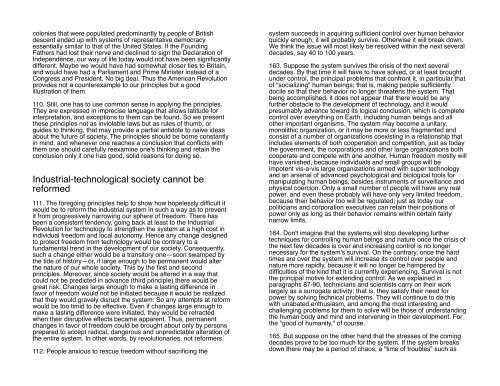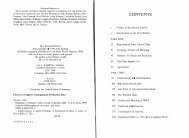Unabomber Manifesto - ouroboros ponderosa
Unabomber Manifesto - ouroboros ponderosa
Unabomber Manifesto - ouroboros ponderosa
Create successful ePaper yourself
Turn your PDF publications into a flip-book with our unique Google optimized e-Paper software.
colonies that were populated predominantly by people of Britishdescent ended up with systems of representative democracyessentially similar to that of the United States. If the FoundingFathers had lost their nerve and declined to sign the Declaration ofIndependence, our way of life today would not have been significantlydifferent. Maybe we would have had somewhat closer ties to Britain,and would have had a Parliament and Prime Minister instead of aCongress and President. No big deal. Thus the American Revolutionprovides not a counterexample to our principles but a goodillustration of them.110. Still, one has to use common sense in applying the principles.They are expressed in imprecise language that allows latitude forinterpretation, and exceptions to them can be found. So we presentthese principles not as inviolable laws but as rules of thumb, orguides to thinking, that may provide a partial antidote to naive ideasabout the future of society. The principles should be borne constantlyin mind, and whenever one reaches a conclusion that conflicts withthem one should carefully reexamine one's thinking and retain theconclusion only if one has good, solid reasons for doing so.Industrial-technological society cannot bereformed111. The foregoing principles help to show how hopelessly difficult itwould be to reform the industrial system in such a way as to preventit from progressively narrowing our sphere of freedom. There hasbeen a consistent tendency, going back at least to the IndustrialRevolution for technology to strengthen the system at a high cost inindividual freedom and local autonomy. Hence any change designedto protect freedom from technology would be contrary to afundamental trend in the development of our society. Consequently,such a change either would be a transitory one—soon swamped bythe tide of history—or, if large enough to be permanent would alterthe nature of our whole society. This by the first and secondprinciples. Moreover, since society would be altered in a way thatcould not be predicted in advance (third principle) there would begreat risk. Changes large enough to make a lasting difference infavor of freedom would not be initiated because it would be realizedthat they would gravely disrupt the system. So any attempts at reformwould be too timid to be effective. Even if changes large enough tomake a lasting difference were initiated, they would be retractedwhen their disruptive effects became apparent. Thus, permanentchanges in favor of freedom could be brought about only by personsprepared to accept radical, dangerous and unpredictable alteration ofthe entire system. In other words, by revolutionaries, not reformers.112. People anxious to rescue freedom without sacrificing thesystem succeeds in acquiring sufficient control over human behaviorquickly enough, it will probably survive. Otherwise it will break down.We think the issue will most likely be resolved within the next severaldecades, say 40 to 100 years.163. Suppose the system survives the crisis of the next severaldecades. By that time it will have to have solved, or at least broughtunder control, the principal problems that confront it, in particular thatof "socializing" human beings; that is, making people sufficientlydocile so that their behavior no longer threatens the system. Thatbeing accomplished, it does not appear that there would be anyfurther obstacle to the development of technology, and it wouldpresumably advance toward its logical conclusion, which is completecontrol over everything on Earth, including human beings and allother important organisms. The system may become a unitary,monolithic organization, or it may be more or less fragmented andconsist of a number of organizations coexisting in a relationship thatincludes elements of both cooperation and competition, just as todaythe government, the corporations and other large organizations bothcooperate and compete with one another. Human freedom mostly willhave vanished, because individuals and small groups will beimpotent vis-a-vis large organizations armed with super technologyand an arsenal of advanced psychological and biological tools formanipulating human beings, besides instruments of surveillance andphysical coercion. Only a small number of people will have any realpower, and even these probably will have only very limited freedom,because their behavior too will be regulated; just as today ourpoliticians and corporation executives can retain their positions ofpower only as long as their behavior remains within certain fairlynarrow limits.164. Don't imagine that the systems will stop developing furthertechniques for controlling human beings and nature once the crisis ofthe next few decades is over and increasing control is no longernecessary for the system's survival. On the contrary, once the hardtimes are over the system will increase its control over people andnature more rapidly, because it will no longer be hampered bydifficulties of the kind that it is currently experiencing. Survival is notthe principal motive for extending control. As we explained inparagraphs 87-90, technicians and scientists carry on their worklargely as a surrogate activity; that is, they satisfy their need forpower by solving technical problems. They will continue to do thiswith unabated enthusiasm, and among the most interesting andchallenging problems for them to solve will be those of understandingthe human body and mind and intervening in their development. Forthe "good of humanity," of course.165. But suppose on the other hand that the stresses of the comingdecades prove to be too much for the system. If the system breaksdown there may be a period of chaos, a "time of troubles" such as






